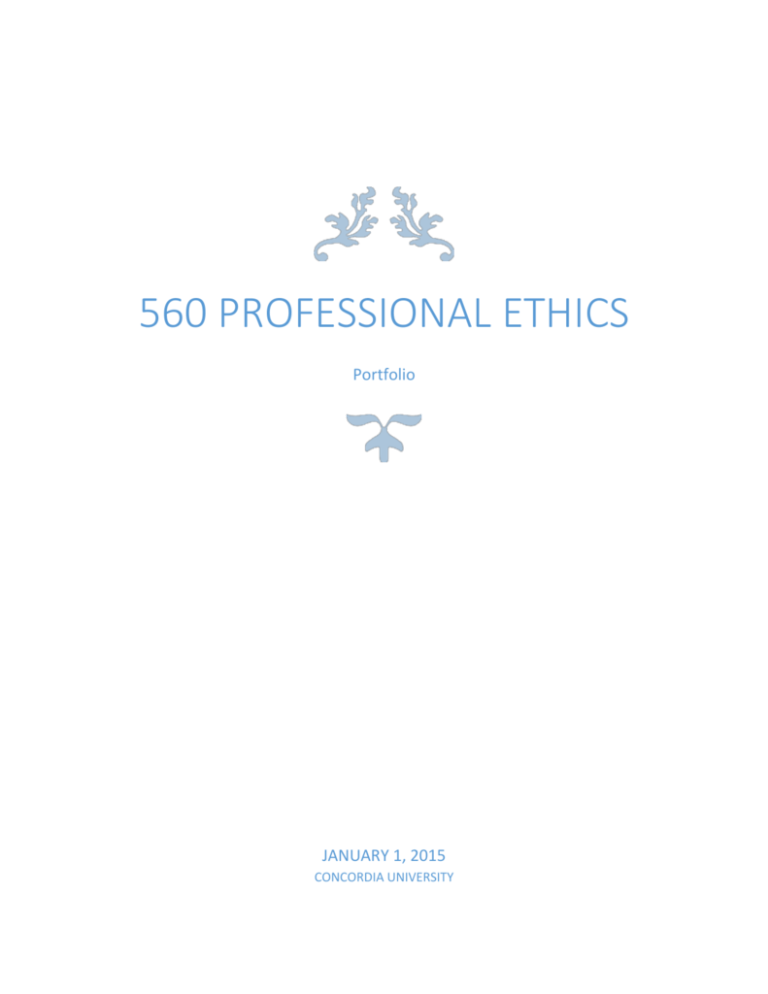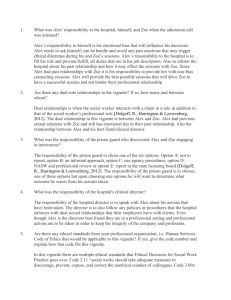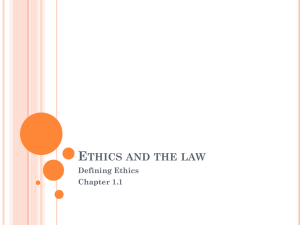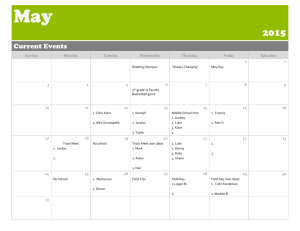560 Professional Ethicsportfolio
advertisement

560 PROFESSIONAL ETHICS Portfolio JANUARY 1, 2015 CONCORDIA UNIVERSITY Alex and Zoe Debra Yeager Concordia University 22 July2014 I think there are many problems here. First and foremost Alex has unresolved feelings for Zoe, and did not express this to his supervisor as he should have. This could have helped avoid many of the issues that presented themselves, because someone (such as his supervisor) could have assisted in this situation. I feel that Alex’s responsibility was first to the hospital and the code of ethics that he is held on when it comes to the situation of Zoe. He should have requested assistance from his supervisor. By not doing this and transferring Zoe to the Prison, which could have harmed her treatment plan and the reputation of not just the prison, but the hospital and Alex, he may have actually put Zoe in harm’s way. Because of the nature of the relationship with Zoe, more individuals should have been involved in this decision. Alex’s supervisor should have been involved in the care of Zoe. Alex has aids, which I am not sure if he has to report that to his employer or not, however I feel that for the safety of his colleagues and his patients, someone in the organization should know, in order to assist in the event of an emergency. The relationship between Alex and his supervisor is a dual relationship. The relationship with Zoe and Alex is also a dual relationship. There may have even been a dual relationship with the hospital and the prison because of the lack of the prison reporting the sexual intercourse between Alex and Zoe to no one else. It makes me question the relationships between the prison and the hospital and the individuals that work at both places. I feel that the responsibility of the prison guard was not just after discovering them having sexual relations, but prior to that. I feel that prisons are responsible for keeping an eye on visitors and inmates. This may have never happened if the prison guard was doing his duties to ensure the safety of the inmates and the visitors. Normally when inmates have visitors there are rules as to how close the two can be, and there is usually someone watching the two interact to ensure that nothing is being given to the inmate and nothing happens that could harm those two individuals or the security of the prison. I believe that someone at the prison knew this was happening before Alex’s supervisor was made aware of the situation. I feel that the guard informing Alex’s supervisor was the first step, but the guard should have notified his supervisor as well and sought out guidance from his leaders in the prison. The responsibility of the hospitals clinical director is to report the incident to the authorities and most likely fire Alex for his unethical acts and for the decisions he made. The clinical director (being Alex’s best friend) perhaps should have known more about this situation. He should have known where his employee was going, how often and whom he was going to see. The clinical director is first responsible to the hospital and the patients, and then to the code of ethics. Even though the prison may not be his jurisdiction, Alex used his work to visit Zoe in prison, and so committed the acts under his profession. In order to protect Zoe and future clients from these actions, the Clinical Director must report the sexually inappropriate behavior and at least suspend Alex pending investigation. But, if I were the Clinical director, whether I was a friend or not of Alex, I would have to report the act and fire Alex for his inappropriate relationship with a patient. I currently do not work in the field, however there is a code of ethics in every job, and in the school one of our codes was to not have personal relationships with students and their families at all, except for school functions, and home visits in which we were to relate to the child and their family and invest interest in their personal life, without ever becoming a part of it. Taking care of Animals Debra Yeager Concordia University 22 July2014 I have been in this situation many times, and even though I do not feel that this should present an issue with any position, I have heard that it complicates the professional relationship. I see no harm in taking care of a colleagues home or animals, however when it is the supervisor it can complicate the relationship, or put the two individuals in compromising situations at some point. It also may be perceived as favoritism in other individual’s eyes. I guess for me personally I would need to know if me performing this duty outside of work would complicate the job or the professional relationship we have. Recent information has shared that “technological advances can usher in ethical unknowns” and can “blur the boundary lines between counselors’ personal and professional lives.” (Shallcross,2011,para.20). Asking someone you supervise will also blur the lines of both personal and professional lives, but it is more of a norm now. It is clear that this complicates things, even as small as watching pets and homes while your supervisor is on vacation, the lines could be blurred Even though no one wants to complicate the professional relationship with their supervisor, it would be appropriate to say no with an apology. Saying no, though, could complicate the relationship anyways, so either way I feel that there will be issues. When it was asked of me at my last place of employment, I had to assess the situation and the professional relationship I had with the person whom asked me. There are many times that I decided that based on the characteristics of the individual I could not help, and others I could if it didn’t challenge our professional relationship. When I had to say “no” to individuals that needed a house and dog sitter, I kindly offered a business card for someone that I knew and trusted that provided this service professionally. Of course as we all read in chapter 10, the military does value many things that are similar to those of social work, and even with the UCMJ, we definitely beat to a different drum. Watching a supervisor’s home and animals is not unheard of in the military setting, nor is it really even questioned in our day to day life. We all make these decisions based on the needs and the potential down falls if all were to go wrong. Part of our life is helping others because we have no family close; we become family, and even though we are fully aware that confidentiality is not as protected in our lives, the needs out weight this in most of these situations. Even though it may not be appropriate to watch my supervisors animals and house for $200 while away on vacation (more likely in my situation –emergency leave) I would not hesitate to help, I would however probably not collect payment, but I would act in a helpful manner, because that is our nature. Dolgoff, R., Harrington, D., & Loewenberg, F. M. (2012). Ethical decisions for social work practice (9th ed.). Belmont, CA: Thomson Brooks/Cole. Shallcross, L. (2011, April). Do the right thing | Counseling Today. Retrieved July 22, 2014, from http://ct.counseling.org/2011/04/do-the-right-thing/ Ethics in My Profession Debra Yeager Concordia University 6 August 2014 There are many ethics in Human Services and many that put individuals in questionable positions. Individuals do not just experience ethical dilemmas at work, but in their personal lives as well. Some experiences define how individuals see certain programs, agencies or even medical facilities. It is important to use these ethical issues to learn from and to address and understand further before being put directly in the middle of it. Some people are lucky enough, like students, to be shared these ethical issues prior to experiences them professionally. I have focused on the information that I think is the most important to share with professionals, young or old, new or dedicated for years, it is always important to focus on the stronger issues to ensure that individuals do not make the mistakes of those that have been examples. Privacy is one big ethical issue that has impacted me directly during this course. Learning about privacy and confidentiality has helped me to understand how I can protect the client and myself as well as my employer. There are many important aspects of privacy and confidentiality, these aspects conflict sometimes, but are important in the field and for protecting the client, as well as the impacts that client has on society. The informed consent which is applicable here with confidentially shares what we can and cannot share about the client and how we can better help them with the services they need. It is imperative to understand how to protect the client and help them at the same time, Of course, in any situation confidentiality could cause some harm or conflicts or could hurt the client, social worker or even people in the community. Social workers need to be able to speak to clients about risk and conflicts that occur in certain situations. They can support each other through this helping process by protecting privacy and confidentially but by understanding how the client may impact others and the limits of the confidentiality. I learned a lot about HIPPA recently as well, not just in class but in my personal experience. HIPPA protects the patient and the situation they are in. While on the phone with the nurse, the nurse asked another fellow nurse “If she has the code, what do I tell her” the other nurse responded “You can tell her anything you want to”, of course with the code, I have full access to my father’s health and his file, so perhaps I should not get upset, however, I felt that the nurse telling the other nurse that she could tell me whatever she wants was not protecting my father or his information or being respectful about it. What should have been said is you can answer any questions she has pertaining to her father, if you know the answer. With this lesson, I didn’t just learn about HIPPA and the privacy of patients, but I also learned that how you say something can change someone’s ideas about a situation or can change the respect individuals have for not just that person, but the profession as well. When she shared that the nurse could tell me anything she wanted, I felt that they could chose what to tell and what not to tell, or they could decide what not to share. This frustrated me because we have HIPPA codes for this purpose and the hospital assured us that we will get the information we want and need with the code. Even though this hasn’t been directly discussed, I think professionals from many different professions need to learn how to be careful with wording and how to speak to others, or how to be more private about information such as this. Value neutrality is something that I have learned a lot about this course with that deals with the ethics of this profession and how to handle clients. This is a hard concept for many people to learn and live. Being neutral on issues is not something that many humans are good at, we have opinions and we stand by our opinions, however there is a time and a place to hold those opinions and with patients or clients, there is no room for personal opinions or values. Our main mission is to assist those that need assisted and to support them in making their own decisions and to be responsible for their own actions. We are to support them and their decisions as workers, and then keep our values at bay. The concept of dual relationships and what I have learned about the issues around them that compromise social work are also important ethical issues of the job. Of course many people understand what a dual relationship is and what happens when a dual relationship is complicating the care of a client, but not many individuals understand when they are in a dual relationship or the limits of the professional relationship. Many times it has been mentioned that some things that would happen with a social worker are based on the relationship with the client, others are forms of cultures that many others may not be aware of. Helping a boss out, accepting gifts and perhaps even touching clients can be considered ethical conflicts of the relationship in the profession and it is important to be aware of these issues and to understand that even though you may know that nothing is going on, the perception of others should always be a concern. Another great thing I have learned that needs to be highlighted for future human service professionals is that each and every client is different. People come in many shapes and sizes, with different skin, religion and culture. The first time you meet the client the human service worker should get to know the client and their needs, but also who they are, what they believe in and what if anything would impact their choices and functioning. All too often people assume that choices are black and white, but our text and other research I have done shows differently. A woman may want an abortion, but will find herself in a hard place because of her religion or the culture she was brought up in. It is imperative to understand your client as a whole, not just their needs, and when a social worker understands the whole client, it will be easier to assist them and get them the help they need. The biggest concern for any human services professional is limited resources. Limited resources have been an issue in my professions for years, but it is clear that human services are feeling an extreme of limited sources and are suffering from it. Resources are limited and it is causing hardship for professionals and for the clients that need these resources. Once the professionals are aware of the limited resources they can work through the needs of clients and get the most sever needs met first. This does cause complications with other individuals that need services as well, but are not in dire need as much as others. This compromise’s the care clients get, but also the relationships that social workers have with their clients. With all the information I have shared herein, it is important to understand that all of these issues tie together to make a very complicated profession. This profession needs good people in it, it needs professionals to understand the limitations of the profession and the hardships that they have to face daily, as well as the hardships of the clients. The continual struggle with the programs and limited resources, as well as the ethical complications such as dual relationships and confidentiality definitely cause even more concern for professionals in Human services. Here I have shared several ethical issues of this profession that need to be highlighted for new human service professionals and even for current professionals. It is important to address and re-address these issues to human service professionals. These issues are important factors for those individuals looking to get education in the field of human services. Individuals must be aware of these issues and the dilemmas they most likely will face in the field and the complications it could cause in their personal lives. Most importantly, being aware of these issues can help the individual emotionally prepare for the profession they are going into and also for the expectations they may have. Having this knowledge can prepare human services workers, and can enhance their experience as social workers or similar positions in this field. Conflict with Code of Ethics Debra Yeager Concordia University 12 August 2014 After the last few weeks I have defiantly had to have a moment with myself and what I am willing or able to do. I like to think that any one of us could help save a life, or change a life, but the truth is, you can only save what wants to be saved, and assist those that want to change their own life. When it comes to the code of ethics, I think that there are many items that I can embrace and stand by my client on, such as this week’s readings. The end of life decisions make me contemplate just how bad their situation is. My father mentioned to me on the phone that he may thinking of this, because the pain is so intense. While I struggle to cope with the potential loss of my father, who am I to criticize his choice or just his investigating of his choices in this matter. No one knows his pain, or what he has already been through, and with the world the way it is, even though I wouldn’t end my life, I am starting to understand that this is not a choice for me to make, but those that are thinking of doing it. My father actually quoted this line to me from our text “Competent individuals should have the opportunity to make their own choices but only after being informed of all options and consequences.” (Dolgoff, Harrington, & Loewenberg, 2012, p. 222) My father stating this to me makes me aware that he has a very good social worker that has been clear and has answered any questions he has had. I would definitely conflict with some ideas of the duty to warn or protect. My understanding is that the duty to warn “refers to responsibility of a counselor or therapist to inform third parties or authorities if a client poses a threat to himself or herself or to another identifiable individual”(Cherry,2014). I think the complicated thing for me would be to differentiate the threats or dangers and the severity of them. There is a good chance that what I perceive to be a threat or danger may not be perceived the same way by someone else. I will have to work on this part continually. Even though I value confidentiality and all it entails, I think it will be a struggle just because the way society is now with technology. I will have to try extra hard to comply with the code of ethics when it comes to confidentiality. One situation that will complicate things is when my client is asking me to keep important information confidential from family while very sick. This complicates an already difficult situation that I am not sure I would know how to handle it. When the patient dies, what if there was information that is very important to be shared about the client? What if the information the dying patient has is detrimental to a family member’s health or survival? This limit would cause me a great deal of conflict. If I would be confronted with situations that are challenging for me, I would have to discuss the issues with a coworker, or supervisor. I think individuals in every profession need time to discuss issues with other professionals in their field, and I feel that when I have a conflict so strong that I cannot come to a decision or what to do, I must get assistance and help myself and my client move forward. Cherry, K. (2014). What is the Definition of Duty to Warn? Retrieved August 12, 2014, from http://psychology.about.com/od/dindex/g/def_dutytowarn.htm Dolgoff, R., Harrington, D., & Loewenberg, F. M. (2012). Ethical decisions for social work practice (9th ed.). Belmont, CA: Thomson Brooks/Cole. Reflection of 560 Professional Ethics Debra Yeager Concordia University During this course I was dealing with my father’s sickness and all the programs that he was being helped by and all the services he was being given. I learned a lot during this time of dealing with the terrible situation about professional ethics and how easy it is to cross that line when in desperate situations. We discussed many situations that we could all be in at some point. Drugs in a home with children and being scared to discuss it because of what it may do to situations in the community. This complicates the services being given as well as the future of the service agency and its clients. Another important discussion that will never see the end is duty to warn and duty to protect. The Duty to warn and the duty to protect are very important aspects of the field and are often confused and are a complicated ideal in its own. I often worry about people in those situations and what they may do in certain areas, but it is pretty clear that no matter what we do or say, these issues will be around for a while. We discussed many ethical dilemmas in the field and how we would all handle them, we also discussed some issues that just should not be a part of our field, even though they will be. Even though we may be helping a client, we cannot do everything for them, nor make the choices for them. We have to support them in making their own choices and leading them to being independent, which is very hard when you see people making so many mistakes. My favorite part of this course is being able to interview an old friend that now works for the state of Nebraska. She loves her job and helping people and thrives on doing better each and every time she meets someone. She has a lot of faith and hope that things will work out, and lucky for her, things seem to. This course has given me a great deal of insight on situations to avoid, how to support team members and how to take care of myself and protect myself in the field. But, ultimately, this course has given me great tools to become better in the field.







